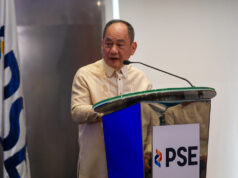Economic growth expected to fall short of target

OVERALL economic growth will likely fall short of the official target this year, according to the country’s Finance chief and a financial and investment advisor, partly due to quickening inflation even as infrastructure development should pick up steam.
“The second-quarter results came out and it looks like our economy took a breather,” Finance Secretary Carlos G. Dominguez III said in an interview last week with Fitch Ratings’ head of sovereign ratings for Asia Pacific, Stephen Schwartz.
The footage was given to journalists on Monday.
Gross domestic product grew by 6% last quarter from 6.6% a year ago and in 2018’s first three months, fueling last semester’s expansion to 6.3% from the year-ago’s 6.6% and against the government’s 7-8% full-year target.
“I think we will still be close to 6.8% this year. I think the momentum on our ‘Build, Build, Build’ is very strong and we are really moving quite well in our infrastructure program,” he added.
Fitch itself expects Philippine GDP growth to reach 6.8% annually from this year to 2019.
Socioeconomic Planning Secretary Ernesto M. Pernia has said that elevated inflation has weighed on growth, adding that GDP expansion will now have to hit at least 7.7% this semester in order to hit the lower end of the government target.
Latest Philippine Statistics Authority data show the overall rise in prices of widely used goods clocking in at a nine-year-high 5.7% in July, averaging 4.5% in the first seven months against the central bank’s 4.9% full-year forecast and 2-4% target range for 2018. The central bank and a BusinessWorld poll expect August inflation — to be reported tomorrow — to hover around 5.9%.
But Mr. Dominguez said that despite inflation’s spike, the economy is not in danger of overheating. Fitch in July flagged a widening current account deficit, high inflation and rapid credit growth as signs of overheating risk, as it then affirmed the country’ credit rating at a notch above minimum investment grade rating with a “stable” outlook.
“I think we can grow at a faster rate in the coming months and we believe that we’re not really in danger of overheating at the moment. We still have long ways to go,” the Finance chief said.
“I think we are still well witihin safe borders. We are looking forward to continuing our ‘Build, Build, Build’ program and we aren’t in great danger. We did pass our tax reform; we have been able to raise our revenues quite significantly.”
Latest government data show that tax revenues grew 18% year on year to P1.47 trillion as of July, while infrastructure and other capital outlays increased by 41.7% annually to P352.7 billion last semester.
He also said the central bank’s 100-basis point cumulative hike in benchmark interest rates this year, so far, should not affect growth prospects that much. “It will a bit… It’s not yet growth threatening because if it were, believe me, a lot of my friends in the industry will be calling me up everyday,” Mr. Dominguez said.
‘GROWTH WILL SUFFER’
For Denmark-based Lundgreen’s Capital, Philippine GDP growth will likely settle around 6.5% this year as inflation will likely eat into real expansion.
Moreover, progress on infrastructure projects remains “very slow” two years into the Duterte administration.
Peter Lundgreen founding chief executive officer of Lundgreen’s Capital, said the government’s 7-8% growth goal is good as missed.
“One reason is… that inflation eats up part of the growth because inflation is spiking too fast… Growth will suffer from the higher inflation because it’s how you calculate growth: gross number minus inflation,” Mr. Lundgreen said in an interview with BusinessWorld.
“If inflation really were set to drop like two percentage points in the coming two months, then there will be a chance for growth to go high again. It doesn’t look like that.”
The Denmark-based financial advisor said 6.5% full-year growth may be doable, but this means that increased activity should be seen between July and December.
Mr. Lundgreen said that while growth is likely to settle below target, economic activity will remain upbeat.
“That doesn’t mean that people will feel there’s less activity, because growth before inflation will remain high,” he said.
However, Mr. Lundgreen said the government has to resolve infrastructure bottlenecks before it can unlock faster growth prospects.
“Apparently, they need to do something about the process because it’s going very slow. The money is getting allocated but the building process — particularly the approval process — somewhere in the system is delayed,” the investment manager added.
The government plans to spend more than P8 trillion on infrastructure up to 2022 on big-ticket priority projects nationwide. Around 35 of 75 projects have been approved by authorities over the last two years.
On the flipside, solid household spending continues to prop up overall economic activity.
“The private consumption story is still valid and pretty strong despite higher food prices, so it means that inflow to the middle-income class is still at a high pace,” Mr. Lundgreen added. — Elijah Joseph C. Tubayan and Melissa Luz T. Lopez



